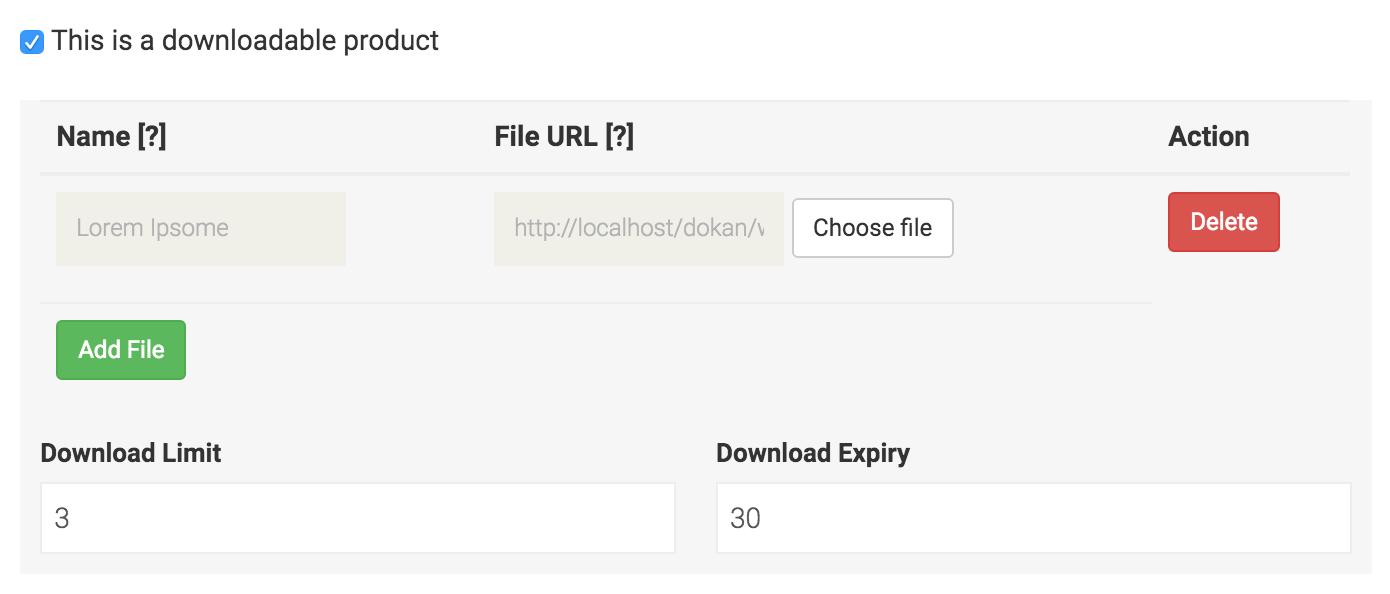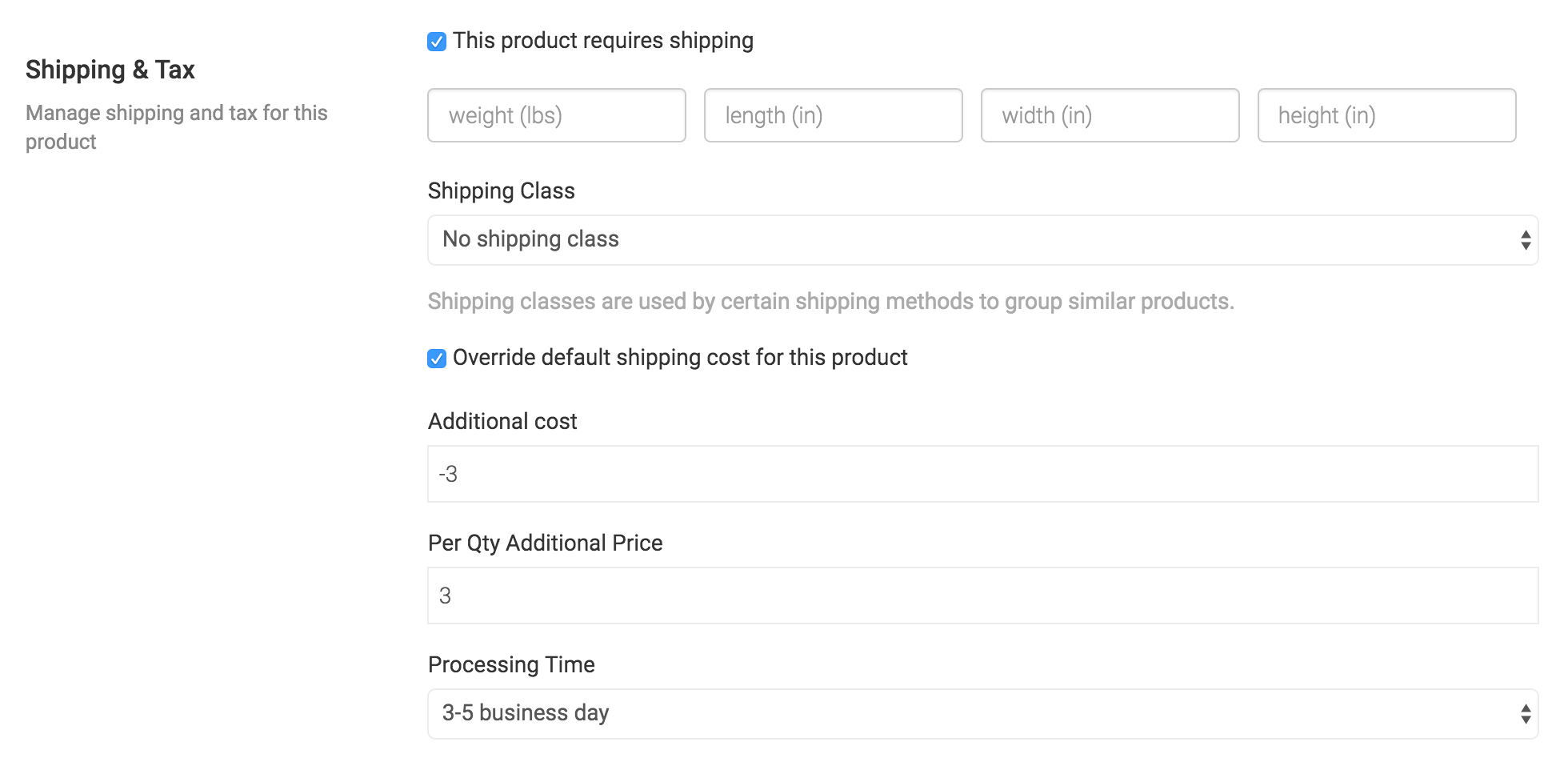How to start selling on Ashop

Before you start
Create an seller account
 You can use your customer account to start selling, or you can create a new Ashops seller account with your business email. Before you sign up, make sure you’re ready with the following:
You can use your customer account to start selling, or you can create a new Ashops seller account with your business email. Before you sign up, make sure you’re ready with the following:- Business email address or Ashops customer account
- Government ID (identity verification protects sellers and customers)
- Tax information
- Phone number
- A bank account where Ashops can send you proceeds from your sales
- PayPal
- Bank Transfer
- Wirecard
- Skrill.
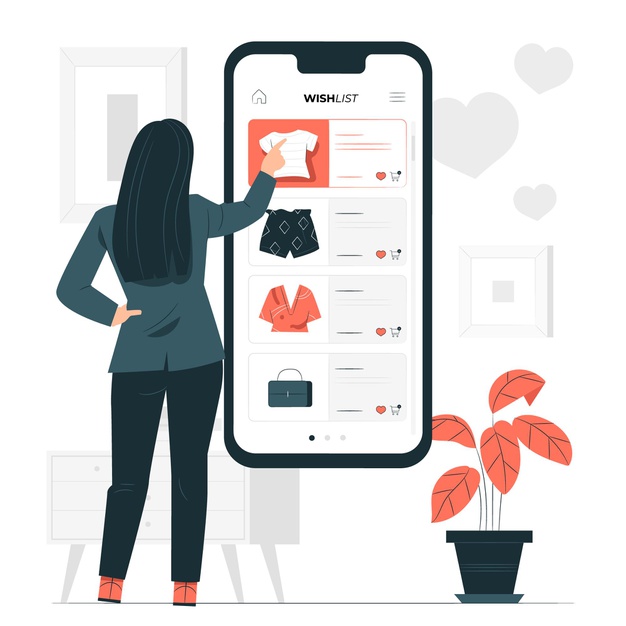
Go mobile
Use the Ashops Seller app to track sales, fulfill orders, find products to sell, respond to customer questions, capture and edit professional-quality product photos, and create listings—all from your phone.
Or Scan QR Code
Adding your products
Creating products as a vendor using is super easy. After your vendor registered on your marketplace, they can easily create products and customize them from an intuitive dashboard.
So check out the documentation to know the process of creating products:-
Create a product from the Vendor dashboard
To create a product, navigate to the vendor dashboard. And then click on Products from the left menu. After that click on the Add New Products button from the top right corner.
You’ll get a new window where you will be able to create a new product giving all the details only.
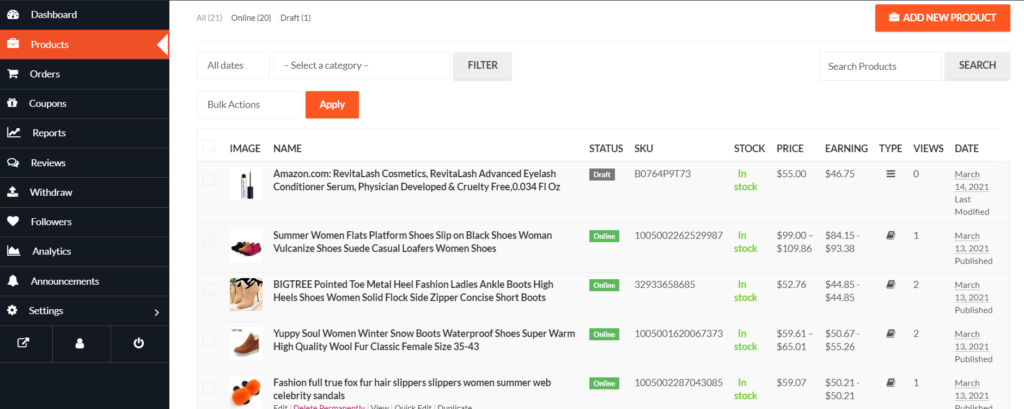
Basic Details
The common information about a product are the title, price, description. Discount price is optional. You can even schedule discounts for a certain amount of time. You can enter a starting date and end date to apply automatic discounts to your product.
Both the categories and tags have to be created by the admin. The vendor can only select them from the frontend dashboard. Because allowing the vendors to create categories and tags might result into duplicates.
Select Category
By default, category selection is singular. That is why there is a drop-down field to select a category. This should be the standard-setting. Because according to Google Webmaster Guidelines and other SEO and UX best practices, it is recommended to have only one category assigned to a product. If you need to show your products based on multiple factors or for searching or sorting feature, you can use tags.
Vendors need to select the category from the drop-down.
Create Tags
Vendors click on Vendor Dashboard>Product>Add New Product. Under the Select Product Tags field, add a tag and Press Enter. The word or phrase will be added as a separate tag.
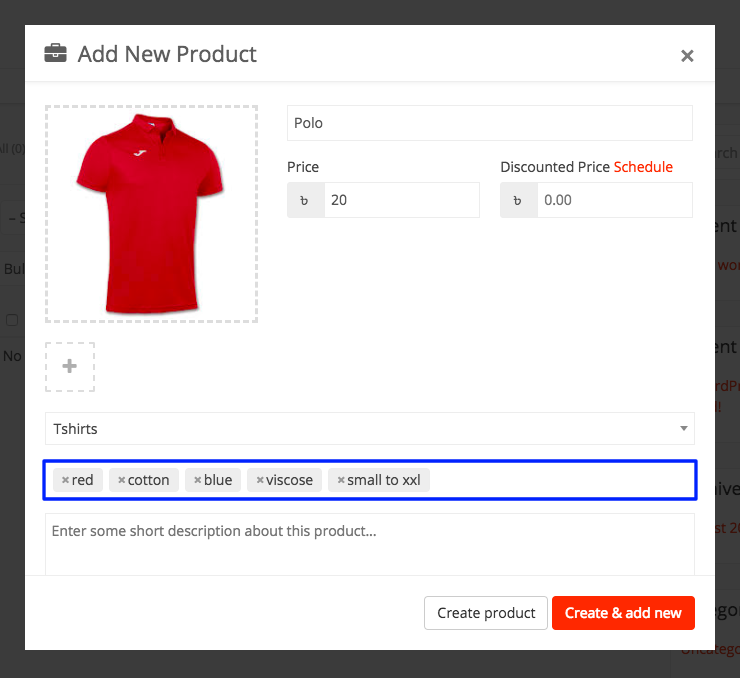
Selecting Product Type – Simple Product
These types of products are simple and have no variants. They are single and standalone products, which does not require any other information to define different variants.
Selecting Product Type – Variable Product
A variable product is a product that has different types of variants. For example, you might want to sell a dress which is available in 3 different colors and sizes. So this option will enable you to add those colors and sizes you need. You can add variations based on anything you like, perhaps material used or the stitching style.
Now if you need custom variations and attributes of your own, then you have to select Custom Attributes and then click Add Option. Then two blank fields will appear to input the variation name and attributes.
You can add as many variations and attributes as you want. When you are done, check the box Create variation using those attributes. The system will make all the combinations and will prompt you to add prices for those variations.
If you want to disable any variation, then you can uncheck the box on the left.
Quantity and variation picture adding function will not be available right away. You have to save the product once to get those options. Right after saving the product, the fields above will have a pencil icon on the right. Click on that to add more details to the variations.
Selecting Product Type – Grouped Product
To learn about the grouped product go through this tutorial.
Inventory and variants
This section holds a bit of complicated information. None of these fields are mandatory. If you do not need to add stock quantity and your is just a simple product, then you can totally skip this section.
But if you are creating a downloadable product or selling a dress or t-shirt, which has multiple sizes, then you should read this section carefully.
What is SKU?
SKU stands for Stock Keeping Unit. It should be a unique set of characters which will not match to any other product.
Enable Product Stock Management
Let’s say you have 10 pieces of the product and you don’t want to receive after orders are placed for 10 units. If you enable stock management and enter 10 in the quantity field, then after 10 units are ordered, this product will show a message that all the quantities are sold and there is no stock.
But, you might want to take some pre-orders before your next batch comes up. So you can Allow Back Order to let the customers place orders even if the product is out of stock.
Downloadable Product
If you are selling photos, music, software or any digital product, then this is the option to use. If you click on the Add File button, three more fields will be added.
The name field defines what the downloaded file name should be. We are letting you define that because you might name the original file to something like “new-album-updated-jan-12.zip” and you want the user to download the file as “New Album”. So this option will be useful for you to serve and organize better.
If you are serving the files from your very own site, then you can click on choose file and select. But you can also serve the file from Dropbox, Google Drive or some other file hosting site you like.
Shipping
- By Vendor from Dashboard Settings – it will allow the feature on the specific store.
After activating the feature from both places. You will get the default shipping price override option. Else only the shipping class selection will be available.
If you have enabled only Dokan shipping and configured the costs in the dashboard settings. Then you might leave all the settings as is. That means you do not have to input any data in this section. None of the fields are mandatory here.
Tax
Here the vendor can only select the pre-made tax classes. If you have missed the tax configuration part in our documentation, you can read it here.
Select Product Type – External/Affiliate Product
You can create External/Affiliate product on Dokan. That way you can create product and redirect them to your Affiliate sites.
While creating a product, you need to select the External/Affiliate product type from the dropdown menu.
Also, you need to add the link to your site in the URL section and define the button name.
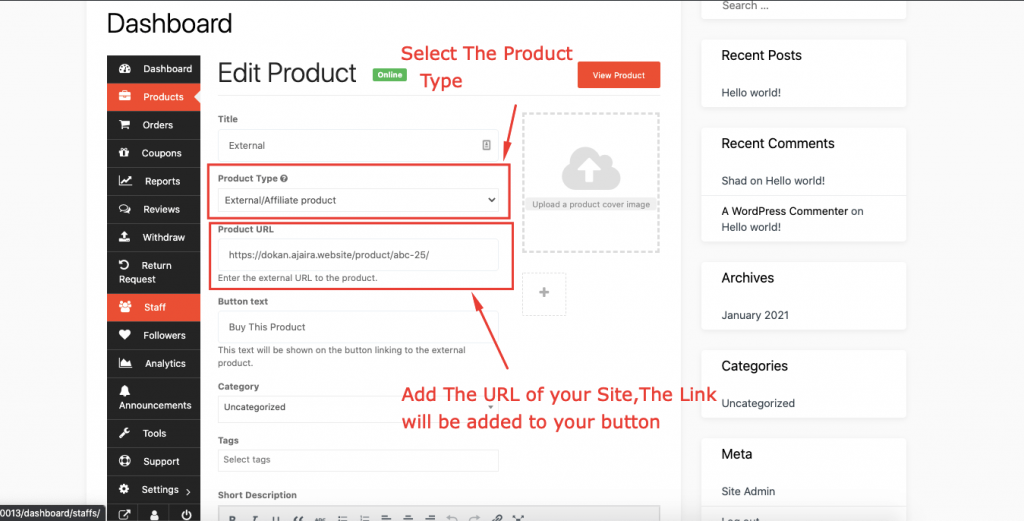
Then you will see the product on the View Product page.
So, when a user clicks on the button he/she will be redirected to the URL page.
Other Options
Visibility: The visibility option defines the privacy of the product. By default “Catalog and Search” is selected. But if you want the product to only appear on category listing page, search results or want to list as a hidden product, then you can select the option respectively.
If you select any other option than Catalog and Search then the product will not appear on the site other than the store page.
Purchase Note: If you want the customer to receive a custom message right after purchasing the product, you can paste that in the box.
Reviews: If the vendor does not want to receive reviews for the product from the customers, he can turn it on or off.
Blank Product Page
When vendors setup their shop for the first time in the marketplace, they may not have any products. However, they can create their products from the Blank Product page.
They can create new products or import products as well. The import product option is available in the pro version.
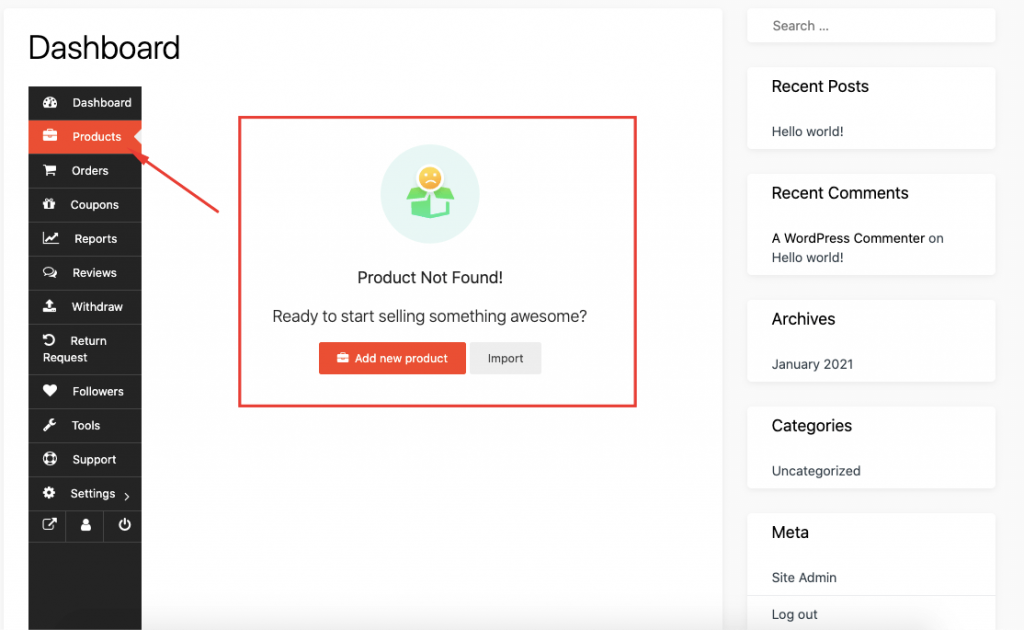
The product detail page

Your offer details will be displayed on a “product detail page.” If you’ve ever shopped on Ashops.com, you’ve seen one. Product detail pages are where customers find all of the relevant information about a particular item.
When multiple sellers offer the same product, Ashops combines data from those various offers on a single detail page. Sellers who offers the product can contribute detail page information—or request detail page reviews if the information displayed is incorrect.
If you sell your products under a registered trademark, consider enrolling in Ashops Brand Registry, a free service that gives you increased control over product detail pages that use your brand name.
1.Title
2.Images
Keywords improve the chances that people will find your listing
Attracting customers
Once your products go live in Ashop’s stores, there are a number of things you can do to attract customers. The Ashops Flywheel describes our method for driving growth.
Below are some ways to consider using
Advertise your offers
Set competitive prices
After your first sale
The moment you’re selling on Ashops is the moment you can start growing. We have tools in place to
Get customer reviews

Grow your business




